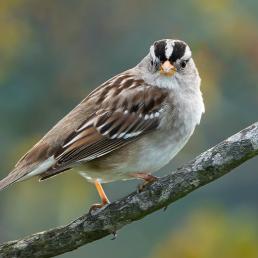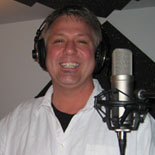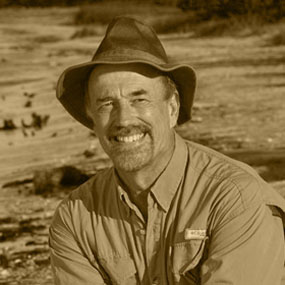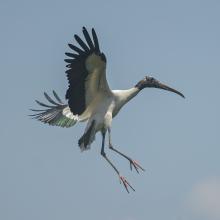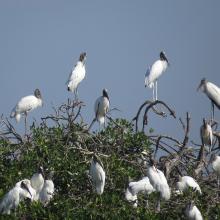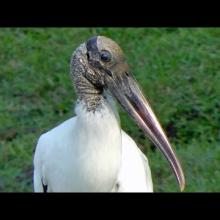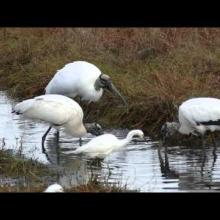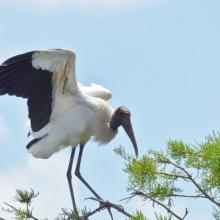

Join BirdNote tomorrow, November 30th!
Illustrator David Sibley and actor H. Jon Benjamin will face off in the bird illustration battle of the century during BirdNote's Year-end Celebration and Auction!
Wood Storks nest in trees, often in big colonies, and only when conditions are just right for them. Because of their feeding technique, they thrive in the early part of the dry season, when receding floodwaters concentrate fish in small pools. But this method of feeding is effective only when the rainy season is normal. In some years, increased droughts brought about by global climate change prevent Wood Storks from breeding at all. Have you ever seen a Wood Stork? Find us on Facebook and share your story.
BirdNote®
Wood Storks and Climate Change
Written by Dennis Paulson
This is BirdNote. [Wood Stork juvenile calling]
With their big bill, naked head and long legs, Wood Storks look ungainly, almost ugly, but they are perfect at what they do.
Large black and white wading birds of Florida and the American tropics, they feed in shallow water by moving slowly along with head down and bill slightly open. When they contact a fish, the bill snaps shut in just 25 milliseconds, [bill clapping] the fastest reaction time known for a bird. But it takes a lot of small fish to fill up a stork, so they are selective about their feeding areas. [Wood Stork bill clapping]
Wood Storks nest in trees, often in big colonies, [colony of Wood Storks] and they nest only when conditions are just right for them [crack of thunder]. Because of their feeding technique, they thrive in the early part of the dry season, when receding floodwaters concentrate fish in small pools. But this method of feeding is effective only when the rainy season is normal. [Rain has faded to nothing]
In some years, increased droughts brought about by global climate change prevent Wood Storks from breeding at all. Then their perfect adaptation to their environment becomes a worrisome drawback. [Call of juvenile Wood Stork]
Have you ever seen a Wood Stork? Find us on Facebook and share your story. For BirdNote, I’m Michael Stein.
###
Sounds of the birds provided by The Macaulay Library of Natural Sounds at the Cornell Lab of Ornithology, Ithaca, New York. Wood Stork colony 36980 recorded by Oliver Hewitt; Word Stork bill clapping 135422 and ambient recorded by Michael Andersen.
Producer: John Kessler
Executive Producer: Chris Peterson
© 2015 Tune In to Nature.org February 2018 Narrator: Michael Stein
ID# SotB-WOST-01-2012-02-15
